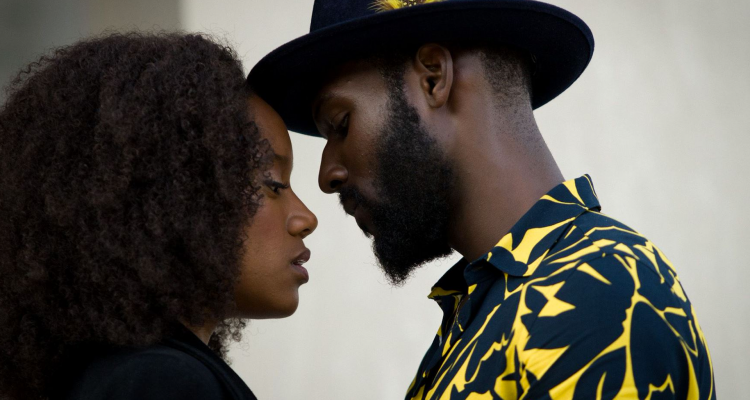We all need a little bit of romance right now. So often the romance genre offers escapist fairytales of destined love, people whisked away by an unlikely figure from their unlucky loneliness to an assured state of joy. For black folks, the genre spawned several seminal black stories — “Brown Sugar,” “Love & Basketball,” “Waiting to Exhale,” etc. — from the 1990s to the early-aughts.
But recently, beginning with “Beyond the Lights” a few years ago, and “The Photograph” as recently as this year, the genre has been experiencing an upswing. A film now arrives at AFI Fest offering an added push on said swing. Co-written with Felicia Pride, Angel Kristi Williams’ feature directorial debut “Really Love” is an evocative romance that’s as steamy as it is patient.
Set in Washington D.C., “Really Love” finds Isaiah Maxwell (Kofi Siriboe), a young painter searching for his voice, attending the solo exhibition of his friend Yusef Davis (Michael Ealy). While there, serendipitously, Isaiah meets Stevie (Yootha Wong-Loi-Sing), a law student at Georgetown. Aesthetically the pair are polar opposites: Isaiah sports a red beanie paired with a red sweater and overalls, possessing an altogether casual vibe, while a cultivated Stevie attracts with a curve-hugging dress, and a gold West African necklace. But with his sly mouldering smile, and her knowing eyes, the pair immediately click.
Their fairytale love affair plays out across D.C. In fact, with “Really Love,” it’s not enough to say the oft-quoted cliche, “the city is its own character.” Kristi Williams takes root and discovers the area’s black-owned gems. Take the film’s opening montage, which crosscuts between Isaiah’s jogs, tableaus of the city’s residents, and shots of its major intersections, capturing Isaiah’s closeness to his community. Editors Steven Pristin and Brian Ufberg ruminate on Isaiah and Stevie’s romance, through long takes, in equal measure. One full-shot sees the two slowly walking toward the camera. Stevie explains how her mother named her after seeing Stevie Wonder in concert in Rotterdam, Netherlands. Conversely, Isaiah’s parents picked his name out of the bible. The scene not only explains the pair’s disparate economic backgrounds, but nurtures the embers crackling between them.
Other lyrical scenes, which often mirror Fonnie and Tish’s joy in “If Beale Street Could Talk” witness the new couple intimately traversing parks and city street fair. Khari Mateen’s profound jazz score, which probably owes some inspiration to Nicholas Britell’s work in the aforementioned “Beale Street,” though its swooning horns, beautifully fills Isaiah and Stevie’s love to the brim. But more than happiness, or even bliss, “Really Love” trades in lust. The sensual sex scenes are not only plentiful, but deliberate and vulnerable.
While many will point to the rarity of seeing such open, lustful images of black romance, the representation would mean little if the execution were not spot-on. As it is, here, through the sultry lighting and the cozy color grading, black bodies are reverently rendered. Also, Isaiah and Stevie are fully committed to one another. Here, in these lingering, intimate scenes, both Siriboe and Wong-Loi-Sing offer their finest work. There’s never a moment where their chemistry doesn’t reflect like sunshine off the dewy grass. It’s absolute trust in its purest form.
The nakedness of Isaiah and Stevie’s passion serves to make their later struggles all the more heartbreaking. For one, both have parents who warn against their life choices. Isaiah’s father would rather the artist get a practical job instead of devoting himself to painting. Stevie’s mother (Suzzanne Douglas) and father (Blair Underwood) see her boyfriend as a lower class interloper. They’d rather she leave him because as her mother explains, “You never want to put anyone first who will never do the same for you.”
Isaiah is incapable of placing Stevie ahead of his art. While his paintings might provoke the ardor within him, the same tenderness doesn’t extend to his girlfriend. As he describes to his patron, his works are distortions of how he sees the world. In a sense, his art conversely distorts his heart because — even when it seems like he might lose Stevie — he’s restrained. For him, it’s the sacrifice he must make at the proverbial altar of the muses. It’s the classic burden the romanticized artist carries. On the other hand, Stevie is outwardly warm, yet her chosen occupation requires a cold wit. In her Q&A with Barry Jenkins, Kristi Williams pointed to “Love Jones” and “Blue Valentine” as inspirations for “Really Love.” But the way Isaiah and Stevie’s love is consumed by their respective careers reminded me more of “La La Land.” And the film, which might frustrate some in its ambiguity, in some ways, adopts the same overwhelming overflow of emotions in its conclusion.
Sometimes Kristi Williams and Pride’s slight script relies too heavily on Isaiah’s obtuseness to spell doom. And further heated exchanges between the couple never bubbles to the surface, when in reality, they should. Even so, this film drips with passion. Featuring a breakout performance from an enrapturing Wong-Loi-Sing, and a beguiling turn from Siriboe, “Really Love” is a timeless black romance. Kristi Williams is an assured new voice already nestling herself inside audiences’ hearts. [B+]

